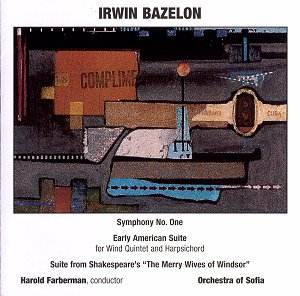I think that it was the English composer Colin Matthews
who said that what was lacking in contemporary music was a composer
with the ability to write fast music, yet also music with a strong sense
of direction. Out of those thoughts he then produced ‘Sun’ dance’. I
can only assume that he hadn’t come across the 1st Symphony
of Irwin Bazelon.
Bazelon is an American composer whose teachers include
Hindemith and Milhaud. The booklet says that he settled on Long Island
a "retreat which was a perfect counterpoint for the tensions and
hustle-bustle of urban life with which his rhythmically complex and
often jazz-tinged music bristles". In truth the notes comment quite
a lot on the jazz influence in this symphony, discussing the high trumpet
writing and his "big band sound". Now I might well have missed
a subtlety here, but for me it is straining a point to talk too much
of jazz inspiration in the context of Bazelon’s music. This is in fact
tough and mostly atonal modern music but which is also listener-friendly.
The Symphony is in a single movement of thirty minutes
duration. It is of great power, excitement, almost catastrophic in intensity
and mostly fast. Where there are slower sections they feel organic and
create a time-space. The overall effect is of a well-balanced work where
slow tempo does not simply amount to an easy way of time filling.
The very helpful booklet notes by the conducted Harold
Farberman have an easily readable analysis of the work with precise
timings given for each section. It’s only a pity that Albany, unlike
say Hyperion which is very good at this, did not give the symphony more
than the one track. Farberman marks the work off into ten sections,
so why not ten tracks to help the listener even more?
Farberman is a well-known figure in Britain as well
as America. He has directed the Bournemouth Sinfonietta; indeed I think
that I heard him do some Ives (on whom he is something of an expert)
with them a few years ago. Bazelon apparently described him as "my
conductor" and so it can be said without fear of contradiction
that what we have here is as authentic a performance of these works
as could be imagined.
For such a complex and demanding score the Orchestra
of Sofia, a slightly ad hoc band I believe, do a remarkably brilliant
job. Again this is down to the expertise of Farbermann.
The other works on the CD are, I’m sorry to say, something
of a come-down.
What on earth possessed Albany to record the inconsequential
‘Early American Suite’? I can only describe it to you as neo-classical
note-spinning. It is scored for Wind Quintet and harpsichord (musicians
not named) and falls into eight movements, with titles like ‘Carriage
Ride’ and ‘Fun and Games’. I can only think that it was to show another
side of the composer’s character - an ability to write tuneful light
music. Yet surely if you warm to the symphony then you will feel let
down by this suite. If you don’t warm to the basically atonal harmony
of the symphony then the suite will not encourage you to fork out top
price for this CD. Surely with so little of this composer’s work known,
would it not have been a better idea to have recorded a work that approaches
the stature of the symphony.
Anyway, if it is any consolation the Suite from the
‘The Merry Wives’ is good incidental music, too good I suspect. It is
something of a stylistic half-way-house between the other two works.
It falls into six witty movements with an intriguing ‘Ballet for a Postman’
and a ‘Dance of the Fairies’ in which the fairies seem a little flat-footed
- even ailing.
So to sum up, an enterprising disc of music by an intriguing
composer.
Gary Higginson

